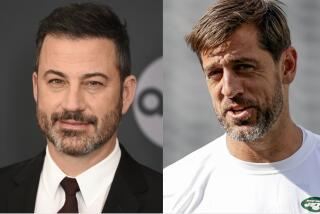McNall Would Let Ismail Play for Both Pro Teams : Football: The NFL prohibits athletes from playing in the CFL during the same season, but the Argonauts’ owner opens door to the Raiders if they can find a loophole.
- Share via
In a surprising twist to an already intriguing story, King owner Bruce McNall said Wednesday night that receiver Raghib (Rocket) Ismail is free to work out a Bo Jackson-type deal in which he could play for both the Toronto Argonauts and the Raiders next season.
“I don’t even know if the Rocket knows about this,” McNall said in Edmonton, where he was attending his team’s NHL playoff game against the Oilers. “But if (Raider owner) Al (Davis) wanted to do it, I wouldn’t stand in his way.”
Standing in the way, however, is an NFL rule that prohibits a player under contract with a Canadian Football League team from playing in the NFL during the same season.
The rule was established to prohibit the stashing of talent in another league for later use.
“The rule was put there for competitive reasons,” said NFL spokesman Joe Browne, league vice president of communications and development, Wednesday night.
McNall said he was aware of the stipulation but left the door open should Davis find a way to slip Ismail through a crack.
“I have not spoken to Al about it,” McNall said. “But if he wants to see if he can get the rule changed, and the NFL allowed it, I wouldn’t say no.”
McNall, who owns the Argonauts, signed Ismail, the former Notre Dame star, to a four-year deal worth a guaranteed $18.2 million. That signing took place Saturday night. Sunday, the Raiders selected Ismail in the fourth round of the NFL draft.
One loophole described was as follows: In order to play for the Raiders in 1991, Ismail would have to terminate his contract with the Argonauts before the end of the regular season in mid-November. If, for example, McNall and Davis worked out a deal in which Ismail’s contract was ended a week before the final game, he would be eligible to join the Raiders.
“The rule says the end of the season,” Browne said. “So maybe you’ve answered your own question.”
Browne said under the old NFL rule, any player who was with a CFL team past July 15 could not play with an NFL team in the same season.
“The rule was liberalized for the player so that the rule now states, ‘If he’s there at the end of the season . . . ‘ “ Browne said. “If he’s cut midway through the CFL season, obviously any player is allowed to play in the NFL in the same season.”
According to McNall, one of Ismail’s agents, Jon Edwards, called McNall Monday and asked if he would allow Ismail to play for the Raiders once the CFL season ended. McNall told Edwards that he wouldn’t stand in Ismail’s way.
The Raiders deny there was any arrangement among them, McNall and Ismail before Edwards’ request Monday.
Asked if he was aware of any such deal, Al LoCasale, Raider executive assistant, said, “No, I haven’t, to tell you the truth.”
Edwards could not be reached for comment.
Many also have speculated that the Raiders had knowledge of an escape clause in Ismail’s contract that would allow him to leave the Argonauts after any of his four seasons.
“The world is full of rumors when it deals with the Raiders,” LoCasale said. “After every draft, there are stories that deal with us. It’s kind of a fun part of the draft. You guys are spending all your time talking about a player that we don’t plan on having in camp next week when the rookies come in.”
Sue Waks, McNall’s chief financial officer, said in Edmonton Wednesday night that there is actually no written escape clause in Ismail’s four-year deal. She said that the agreement is oral.
“All I’ve said is what Bruce has been saying all along,” she said, “that if it made sense for Rocket to get out of his contract, he wouldn’t stand in his way. And that’s the closest we get to an out-clause. It’s a gentlemen’s agreement.”
McNall, standing nearby, stood by Waks’ statement.
“She did the contract,” he said. “I’ve been involved with hockey. All I did was sign it.”
McNall said the escape was agreed upon in the event Ismail should regret his decision to play in the CFL.
“I don’t want an unhappy player,” he said. “And If he’s unhappy, we can work something out. That’s what I meant by that.”
The Ismail contract story was the buzz of the NFL Wednesday. The consensus after several interviews with NFL officials was that four teams--the Raiders, the Atlanta Falcons, the Dallas Cowboys and the New England Patriots--had knowledge of Ismail’s escape clause.
The question remains: What did the Raiders know and when did they know it?
There is little doubt the Raiders feared Ismail might not last until the fifth round, which might explain why they traded their 1991 fifth-round pick and next year’s fourth-round choice to New England to move up into the Patriots’ fourth-round position. Cowboy owner Jerry Jones said Wednesday that his team was interested in taking Ismail in the fourth round, as the 106th player, before the Raiders traded up and took the receiver with their newly acquired No. 100 slot.
The fact the Raiders used such a high choice on Ismail raises questions, but it has not been unusual for the Raiders to make unpredictable picks. In 1983, they drafted wide receiver Mervyn Fernandez in the 10th round, even though he had opted for the CFL. In 1986, they took Napoleon McCallum in the fourth round, even though his career was in doubt because of a U.S. Navy commitment. And, of course, in 1987 the Raiders selected Bo Jackson, who originally spurned the NFL to pursue a baseball career, in the seventh round.
“Those were shots we took,” Steve Ortmayer, Raider director of operations, said. “We believed that, at some point in time, the Rocket may decide to do something different. If he does, we’ll be there.”
Perhaps sooner than most thought.
Times staff writer Jerry Crowe, in Edmonton, contributed to this story.
More to Read
Go beyond the scoreboard
Get the latest on L.A.'s teams in the daily Sports Report newsletter.
You may occasionally receive promotional content from the Los Angeles Times.











